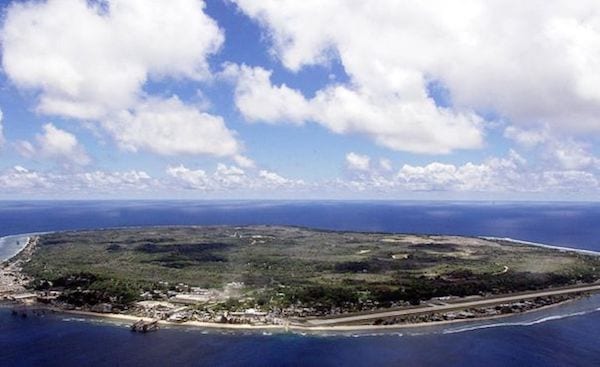Imagine being just 14 years old, forced to flee your home because you fear persecution. You leave without your parents by your side, believing that Australia—the land of the fair go—would offer you refuge.
In 2013, this was the hope of 24 children (aged 14-17 years) from Iraq, Iran, Afghanistan, Pakistan, Sri Lanka and Myanmar.
But instead of protection, they were intercepted at sea and sent to a sweltering detention camp on Nauru.
These vulnerable children, left to endure unimaginable conditions, later filed a complaint with the UN Human Rights Committee. What they faced there was unconscionable: Extreme heat, overcrowded tents that flooded in the rain, limited water, inadequate healthcare, and constant exposure to trauma.
This wasn’t just neglect—it was deliberate cruelty to ‘deter’ other refugees, funded by Australian taxpayers and carried out in our name.
For years, Australia has denied responsibility, vehemently arguing that it’s not accountable for what happens in another country. But last week, the UN Human Rights Committee rejected that argument, finding that Australia violated these children’s human rights and is responsible because it has ‘effective control’ over the offshore processing system on Nauru.
The real question now is whether we will finally take responsibility—or continue to look the other way.
The same year those 24 children were sent to Nauru, I co-led the Australian Human Rights Commission’s landmark National Inquiry into Children in Detention. Despite being denied permission to travel to Nauru by the Australian government, we proceeded to investigate the impact of detention of the children held there. Our investigation uncovered harrowing accounts of life in the camp. It’s crucial to understand what these children endured, and the toll it took on their mental and physical health.
As documented in our report, The Forgotten Children, we found that children detained on Nauru were forced to endure appalling conditions.
Temperatures inside the detention tents often soared to 45–50 degrees Celsius, with suffocating humidity and little relief from the glaring sun. Families lived in overcrowded vinyl marquees housing up to 15 families, separated only by thin cloth partitions that offered no privacy or respite from the constant noise. These already dire conditions were compounded by the camp’s proximity to phosphate mining, which created thick dust linked to asthma and skin irritation. Flooding during rains and mouldy, deteriorating tents only added to the misery. Water was limited. Showers may be restricted to 30 seconds each day. At other times water appeared to run out altogether. This environment was not just harsh but actively harmful, inflicting untold physical and psychological distress on the children Australia was meant to protect.
Healthcare for detainees on Nauru was dangerously inadequate for children. The health provider lacked a paediatrician or staff with advanced child health training, leaving children at risk during critical illnesses due to delays in medical evacuation. Emergency response was similarly inadequate, with one ill child forced to wait for a bus instead of receiving an ambulance. Vaccination programs were inconsistently delivered, leaving many children unprotected against preventable diseases. These failures put vulnerable children’s lives in danger.
Unsurprisingly, we found that children in detention on Nauru were suffering from extreme levels of physical, emotional, psychological and developmental distress. Here is a snapshot:
- Children faced severe mental health deterioration, with reports from physicians of teenagers and unaccompanied children being placed on suicide or self-harm watch daily.
- Overcrowded and unhygienic conditions led to frequent outbreaks of lice, gastroenteritis, and skin infections, while some children experienced significant weight loss due to despair and loss of appetite.
- Unaccompanied children suffered acute distress from family separation, and many exhibited emotional breakdowns and behavioural issues triggered by minor changes in their environment.
- The detention environment exposed children to daily trauma, including witnessing self-harm among adults, which compounded their suffering and delayed recovery from past persecution.
So where to now?
Australia prides itself on being a champion of human rights, but that reputation only holds if we follow through on our commitments.
By voluntarily signing up to the international human rights system, we agreed to respect rulings from bodies like the UN Human Rights Committee. Yet time and again, when the findings are politically inconvenient, they’ve been swept aside. This isn’t just about Australia; ignoring these decisions undermines the global human rights system and signals to other countries that they, too, can shirk their responsibilities. In today’s interconnected world, cooperation with the international community is essential. Refusing to comply with the UN’s ruling risks alienating allies and weakening Australia’s influence in tackling global issues.
The UN found that children were arbitrarily detained in violation of international law and should be compensated. Australia can’t shy away from this—it must take responsibility. That means compensating the children who’ve suffered, evacuating the remaining 100 asylum seekers, and making sure this never happens again by abolishing offshore detention. Ignoring the ruling doesn’t just compound the harm done to these kids; it isolates Australia on the world stage and chips away at our credibility. If we want to stand as a leader in justice and fairness, we must show it through action.



